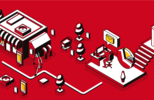Performance support – the centerpiece of a successful learning architecture
Show me similar content
Performance Support Learning Concepts Knowledge Transfer Corporate Learning Retail
Top-notch quality at an unbeatable price – Lidl promises a great deal and does its utmost to keep its word every day. In doing so, the company generates total annual sales of 82 billion euros in 30 countries. To achieve such figures, Lidl focuses on what really matters – a clearly structured portfolio that features up to 1,700 food and non-food products every day, including regional specialties. Added to this are efficient processes that make it possible to offer those all-important savings in the discount store sector.
On the ball thanks to growing learning architecture
It might sound like a straightforward recipe for success, but there is little room for error in the discount store business. Virtually no other sector is shaped by such cut-throat competition, with newcomers such as Amazon bringing disruptive ideas that ramp up the pressure on brick-and-mortar retailers. “With the level of complexity and pace of change in our sector being so high, we can no longer rely on preparatory learning alone,” says Tobias Kindler, Head of Learning Technology & Performance Support. “That’s why it’s becoming hugely important for us to provide them direct support at the workplace whenever they’re in urgent need of information.”
In late 2017, Lidl paved the way for doing just that, rolling out the tt performance suite throughout the entire company worldwide. The tts software is not a substitute for conventional classroom training or awareness campaigns. Both are still in place at Lidl, partly because not every member of staff works at a PC. It is, however, the centerpiece of a global learning architecture that never stops evolving. Indeed, Kindler and his team are always on the lookout for new ways of putting the tt performance suite to use.
Based on various use cases, Lidl compiles specific application products that first undergo testing as prototypes. Only those that make the grade are then rolled out across the company. They cover everything from eLearning and step-by-step guides and their context-sensitive provision in the workplace right up to interlinking with additional systems, including collaboration applications on the intranet, the learning management system (in this case, SAP SuccessFactors Learning), web applications, mobile apps and chatbots. “Every use case brings its own requirements, but due to our decentralized structure, which encompasses 700 authors based in 30 countries, they need to be easily scalable,” says Kindler. “We therefore attach particular importance to intensive communication between everyone involved (especially those responsible for the learning content), clear roles in the learning process and, last but not least, a high degree of standardization when creating and providing all content.”
One recording, three formats, a multitude of uses
When it comes to creating IT support content, for example, Lidl has standardized things so that a video tutorial, a step-by-step guide (tt guide) and PDF documentation are created for every recording.
The company then makes these three formats available via various channels, meaning they can be accessed using the built-in online help, a direct link leading to the exact guide required, the tt performance suite portal or the QuickAccess function in the Windows taskbar. “Needless to say, the web-based QuickAccess feature is particularly impressive because you can integrate it into any software. This enables us to help others above and beyond in-house staff, such as external call center employees who work with our Salesforce application,” explains Kindler.
Tobias Kindler, Head of Learning Technology & Performance Support, Schwarz IT KG
We have hooked the tt performance suite up to other IT applications to create a ‘single source of truth’ for IT guides.
It goes without saying, however, that Lidl uses lots of other potential applications to continuously expand its performance support offerings. “We have hooked the tt performance suite up to other IT applications to create a ‘single source of truth’ for IT guides,” says Kindler. At the same time, Lidl also greatly improves the applications. An interactive HR chatbot, for instance, now has access to all 6,000 step-by-step guides currently available, meaning it can answer questions on a whole range of IT tools. According to Kindler: “Thanks to this relatively simple enhancement, the chatbot’s responses have improved significantly because it can now answer queries like a virtual assistant, including queries it wasn’t originally programmed for.”
How performance support empowers brick and mortar for the 21st century
Simplicity is a key success factor
Keen to make the tt performance suite and QuickAccess as straightforward as possible for authors and users, Lidl has made a number of design modifications, for example to avoid multiple listings of documents in different formats. Now, users are initially only shown the titles and need to click their mouse to see the formats, meaning more hits are visible.
Lidl has also streamlined the user interface and the system functions for authors. By cutting out everything but the key functions for IT guides in the tt performance suite authoring tool, for instance, the company has made it easier to use the tool and focus on the content. What’s more, by extensively automating technical processes, Lidl ensures that predefined standards are adhered to – despite decentralized structures and local responsibility for drawing up materials.
Tobias Kindler, Head of Learning Technology & Performance Support, Schwarz IT KG
The interface’s configurability and the support functions for the production process are clear strengths of the tt performance suite.
When it comes to creating eLearning content, Lidl makes up for casual authors’ lack of teaching expertise with templates containing notes about editable elements and information on how to make teaching materials better. “The limited functionality – coupled with the information on how to use the templates built directly into the templates themselves – takes a lot of hassle out of creating and localizing digital learning content,” says Kindler. “The interface’s configurability and the support functions for the production process are clear strengths of the tt performance suite.”
Despite resounding success, Kindler and his team have still got a fair bit of work to do. The development of an appropriate eLearning configuration for specialist authors and everyday operations involving a large number of guides, for instance, still require standard features of the tt performance suite to be refined and adjustments to be made at Lidl. On top of this, linking the tt performance suite to other applications is taking on new dimensions. The IT departments of Lidl, Kaufland and Schwarz are currently being merged to form “ONE IT” at Schwarz IT KG, which is responsible for the IT used by every one of the Group’s 400,000 employees. “This will mean we can use the tt performance suite throughout the entire Group for all IT guides,” says Kindler. “I am confident this will offer us real added value.”
Facts & figures
- 260,000 employees and 10,500 stores in 30 countries (Lidl)
- Sales of 82 billion euros (Lidl, 2018)
- Decentralized content creation with local responsibility
- 30 key users and 700 authors
- More than 6,000 IT guides
- Integration of third-party systems, including chatbots, mobile apps and web applications
Show me similar content
Performance Support Learning Concepts Knowledge Transfer Corporate Learning Retail



